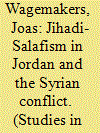| Srl | Item |
| 1 |
ID:
158227


|
|
|
|
|
| Summary/Abstract |
Over the last decade, a rift has emerged among Jihadi-salafis in Jordan between the “Zarqawiyyun”—who see Abu Mus‘ab al-Zarqawi as their model and concentrate on combat—and the “Maqdisiyyun”—who want more scholarly guidance, emphasize the establishment of an Islamic State and follow Abu Muhammad al-Maqdisi. The conflict in Syria, however, offered options for both: a jihad against a reviled regime and the possibility to set up an Islamic state. It thus had the potential to unite the “Zarqawiyyun” and the “Maqdisiyyun.” This article analyzes why this did not happen.
|
|
|
|
|
|
|
|
|
|
|
|
|
|
|
|
| 2 |
ID:
142642


|
|
|
|
|
| Summary/Abstract |
Jihadist violence is typically associated with being particularly indiscriminate. Often, as in variations of the ‘new terrorism’ thesis, this characteristic is proposed to correspond in some way to its other attributes such as its globalised, decentralised and ‘postmodern’ religious nature. Recent work appears to give more substance to such claims, by claiming to show a relationship between indiscriminate violence and decentralised group organisation. However, in this paper we show, based on an analysis of jihadist targeting in Western Europe and America from 2001 to 2013, that targeting choices by jihadists unconnected to organised militant groups have in fact been consistently more, rather than less discriminate in their targeting choices than their better-integrated peers. Drawing on this finding, as well as a broader reading of jihadist targeting discourses, we argue for a more complex understanding of the relationship between radicalisation, extremist ideology, decentralisation, and targeting choice.
|
|
|
|
|
|
|
|
|
|
|
|
|
|
|
|